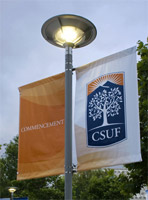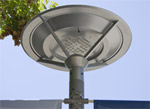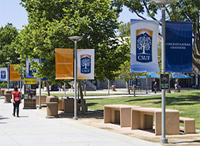This is exactly the kind of lighting project the Obama administration would be proud of. A large entity, motivated through financial incentives, replaces hundreds of energy-guzzling, metal halides with efficient-and-programmable LEDs to save energy and create jobs.
The large entity, in this case, is California State University, Fullerton (CSUF). Taking advantage of financial incentives offered by Southern California Edison (SCE); CSUF is replacing hundreds of pedestrian luminaires with Premier post tops and Aria - Wall Sconce by Visionaire Lighting; and networking the poles via a wireless communications system from Exergy Controls.
 Best part? By combining several smaller projects together, CSUF got SCE to pick up half the tab for the entire package. Best part? By combining several smaller projects together, CSUF got SCE to pick up half the tab for the entire package.
Sounds easy on paper, but Doug Kind, Manager of Commissioning and Energy for CSUF, and his department deserve all the credit. Doug took a macro view approach towards putting all the players in place. Result? CSUF will save nearly $800,000 in product-and-installation costs, 70% on future energy bills, and another $40,000/year in maintenance expenses.
It's the happy ending to a year-and-a-half long planning stage that hit a fairly serious roadblock at one point — when the wall pack from another manufacturer failed to pass U/L; and the only DLC-approved pedestrian fixture they could find was outside the university's budget. DLC stands for DesignLights Consortium. It's the entity that independently qualifies fixtures for funding from energy companies nationwide (see list). Think of it as the EnergyStar for commercial/outdoor lighting.
Without that certification, CSUF could not move forward; and the clock was ticking down on their funding window.
"At that point, we contacted Gary Lazenby of West-Lite Supply, with whom we'd had a long-standing relationship," says Jeff Bechtold, who works with Doug as CSUF's Energy Coordinator. Understanding the campus' needs, "Gary put us in touch with Mark Marincovich of Site Lighting Systems, who brought us all to Visionaire Lighting's factory."
At Visionaire Lighting, Larry Branam, EVP of Sales and Marketing; and Joe Kay, VP of Sales, toured everyone through their facilities. Then they brought in Bill Hein, VP of Product Development; and John Wandrey, Director of Engineering — and everyone sat down, and just listened.
"After we'd explained what we were looking for, Visionaire Lighting told us to pick a fixture," continues Gary, "and they would do the rest. CSUF even chose a discontinued style — but, no matter — John Wandrey put one of his top engineers on the project, Aida Spremo, and they built a sample in time for the tests. So, basically, Visionaire Lighting entered the competition during the last two weeks of consideration, and was able to outscore every other entry with a fixture designed specifically for CSUF's needs."
"Ultimately, the Premier fixture won us over with its Photometrics," says Doug Kind, summing up how Visionaire Lighting went head-to-head against AAL, Beta and Sylvania to ultimately win their 14-phase, 840-luminaire retrofit project (which already included some garage and street lighting). "But then Visionaire Lighting volunteered to build the communications controls from Exergy right into the fixture and, at that point, it was like, how could we say no?"
 The Exergy Control system became the final, winning piece of the puzzle; and Jim Haas, Exergy's Director of Sales & Marketing, has nothing but praise for Doug Kind's multifaceted approach to such a large undertaking. "Doug looked at the problem from the viewpoint of both an Electrical Engineer and an end user; and created a multi-departmental task force to dissect the problem from every angle — taking factors into account like sustainability, efficiency and control." He built them into the final scoring model used to judge the fixtures, and, in fact, "questions from CSUF helped us to modify and improve how our product would ultimately function for them, too." The Exergy Control system became the final, winning piece of the puzzle; and Jim Haas, Exergy's Director of Sales & Marketing, has nothing but praise for Doug Kind's multifaceted approach to such a large undertaking. "Doug looked at the problem from the viewpoint of both an Electrical Engineer and an end user; and created a multi-departmental task force to dissect the problem from every angle — taking factors into account like sustainability, efficiency and control." He built them into the final scoring model used to judge the fixtures, and, in fact, "questions from CSUF helped us to modify and improve how our product would ultimately function for them, too."
Indeed, the controls are fascinating. Communication is two-way, based on a frequency-agile, ZigBee wireless radio system that allows for down-to-the-fixture manipulation. Doug drew a diagram of how he wanted the system to perform (at left); but also required that those controls be flexible enough to support immediate-need changes — like being able to switch to full brightness during an emergency. The system had to be reviseable, too, so usage plans could be further refined. To meet their requirements, Exergy produced a system with four levels of permission. At the first level, users might simply view the data; while fourth level users could fully schedule every aspect of lighting output.
Using campus photocell information, Exergy commissioned each fixture according to its own algorithm. Two lights right next to each other might not even have the same output, depending on the characteristic of the area they illuminate. Two-way communication allows staff to query individual fixtures, too, to determine if the LEDs need changing.
Not that that's likely any time this decade — another reason Doug chose LEDs for the retrofit. "Basically," he offers, "LEDs last so long, we get to take our campus Electricians out of the business of changing light bulbs, and put them where they're needed most. And," he says, somewhat proudly, "because of this project, we are able to keep people working, and even hire others temporarily."
 Last month, as part of his duties on the California State System's Energy Manager Users Committee, Doug hosted counterparts from three other state universities. All came to see what Doug and the largest state university in California are accomplishing. Last month, as part of his duties on the California State System's Energy Manager Users Committee, Doug hosted counterparts from three other state universities. All came to see what Doug and the largest state university in California are accomplishing.
That's no surprise to Jim Haas, who knows Doug's extensive credentials, and how well-positioned he was to tackle this problem and solve it. "It's like Doug was the conductor, and the rest of us were musicians. That's how professionally this entire project came together."
Maybe someone should tell the Obama administration? They'd surely be pleased. |